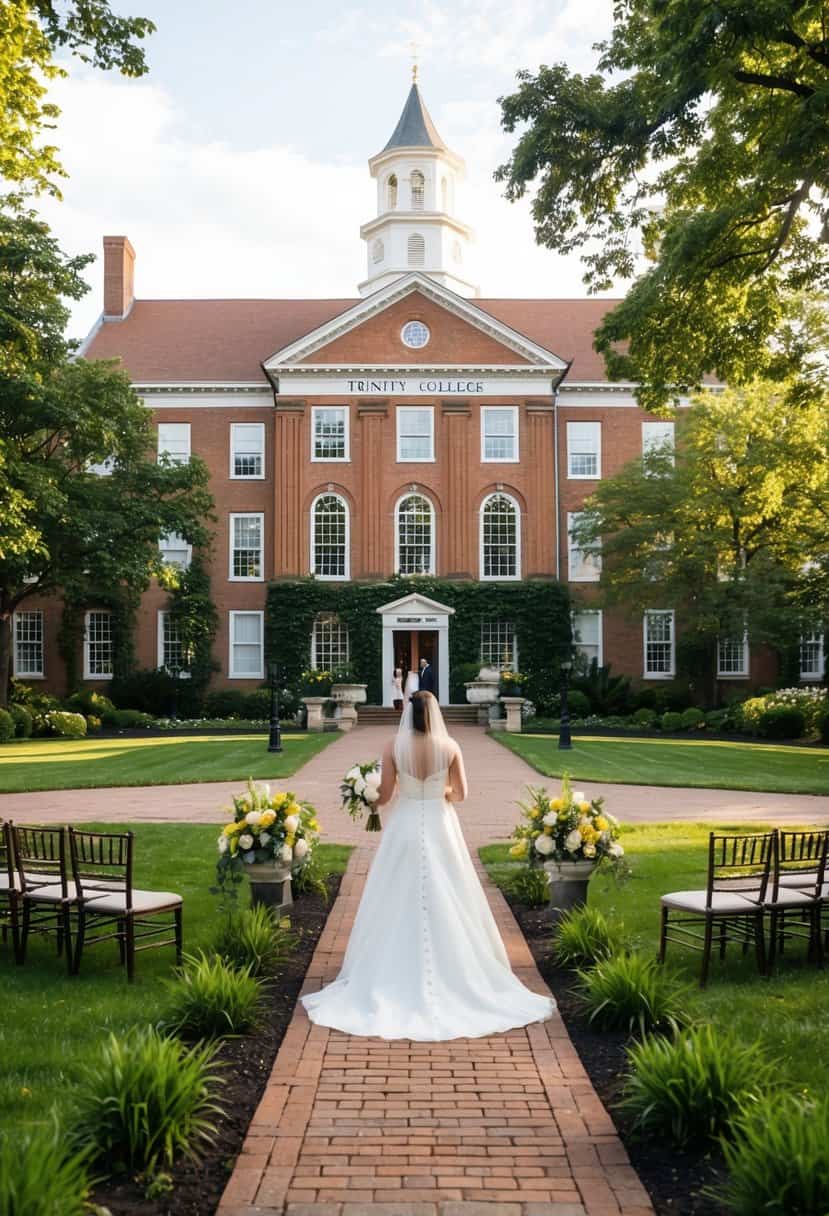How Much to Get Married at Trinity College? A Friendly Guide to Costs
Getting married at Trinity College can add a touch of history and elegance to your special day, but what are the costs involved? While the iconic setting offers a priceless atmosphere, you might be wondering about the actual financial details.
At Trinity College Dublin, you can organize your wedding in the college chapel. The official site does not directly list wedding costs. You may need to consider reaching out to the college directly to get accurate figures.

Imagine the charm of the college chapel, where many from the college community have tied the knot, adding personal significance to the venue. This offers a unique space to celebrate your love with the comfort of being surrounded by an academic community you cherish. The historical significance and intimate setting make it a popular choice among both alumni and current staff.
You’ll be joining a vibrant community that values tradition and connection. Exploring the wedding options at Trinity College Dublin can also give you the opportunity to relive memories or create new ones on campus.
Understanding Trinity College Wedding Costs

When planning a wedding at Trinity College, you’ll need to have a clear idea of the potential costs. You’ll encounter the main expenses such as chapel rental and additional costs like room and board. It’s wise to consider how your personal preferences may influence the total cost.
Sticker Price vs. Net Price
The sticker price refers to the initial cost of renting the chapel at Trinity College. Prices can range from $2,500 to $3,500, depending on the season and the day of the week. This price gives you the basics, like the use of the venue for your ceremony.
The net price, however, includes more personalized factors. For example, you might need decorations, a photographer, or additional accommodations for guests. These costs can add up, so it’s beneficial to list what extras fit into your budget.
By planning ahead, you can avoid surprises and ensure your day is special.
Room and Board Considerations

If you’re hosting out-of-town guests at your Trinity College wedding, room and board might be necessary. Trinity College doesn’t directly offer lodging, but nearby hotels can accommodate.
Arrangements for meals and lodging will enhance the wedding experience. You might consider daytime catering services for guests. Knowing local options will help provide comfort without overspending.
Additional Personal Expenses
Aside from the main costs, you’ll face other personal expenses. These might include attire, music, and flowers. Such elements personalize your wedding but can lead to increased total costs.
Careful planning ensures these additional expenses align with your overall budget. Making early decisions helps keep your costs in control and adds unique touches to your wedding day at Trinity College.
Financial Aid and Scholarships

When planning your wedding at Trinity College, understanding financial aid options and scholarships can help you manage costs. This section provides an overview, describes available scholarships, and explains need-based aid.
Overview of Financial Aid
Financial aid is a valuable resource for students at Trinity College. Aid can come from various sources like internal and external funds, grants, and loans. The college offers financial packages that may include endowed funds, unrestricted grants, and more.
Financial aid eligibility at Trinity is determined by assessing your family’s income and needs each year. This means your aid package might change as your financial situation changes.
Scholarships and Grants Available
Trinity College offers several scholarships and grants to help with educational expenses. These can be merit-based or need-based and might include Trinity’s own endowed scholarships or state and federal grants.
Grants and scholarships usually don’t need to be repaid, making them an attractive option for students. Checking the eligibility criteria early can help you apply for the right opportunities to fit your needs.
Understanding Need-Based Aid
Need-based aid is determined by your financial situation and family income. At Trinity, your need is evaluated yearly using information like family income, assets, and household size.
This ensures assistance aligns with your current financial circumstances. Programs like Pell Grants are part of this, helping students from lower-income backgrounds cover costs without accumulating debt. Understanding these criteria can help you plan better.
Budgeting for Tuition and Fees

When planning your finances for studying at Trinity College, it’s crucial to understand the details of tuition and the related costs you’ll need to cover. Knowing exactly what expenses to expect will help you budget effectively during your time at the college.
Breakdown of Required Fees
At Trinity College, tuition for 2024-2025 is $67,420 for a full academic year. This figure might seem high, especially when compared to other institutions. It’s important to keep in mind that this fee covers the standard course load, which includes courses ranging from 3.00 to 5.75 credits per term.
Costs beyond the standard course load can result in extra charges. It’s wise to account for this if you plan to take additional credits. You should also consider other required fees that might not be included in the tuition, such as student services and technology fees.
Cost of Books and Supplies
Books and supplies can add a notable amount to your budget. It’s a wise practice to set aside about $1,000 annually for these materials.
This estimate covers textbooks, lab materials, and other necessary supplies you’ll need for your courses. Some courses might require more expensive materials, so it’s helpful to check with your professors at the beginning of each term.
Buying used books or digital versions wherever possible can also help reduce these costs. Planning ahead and exploring options like rentals can make a significant difference in your overall expenses.
Student Loan Insights

When navigating student loans, understanding the difference between federal options and other financial aid like federal work-study can be valuable. It helps you decide what’s best for your financial situation.
Federal Student Loans
Federal student loans are a popular choice for financing college. They usually offer fixed interest rates and flexible repayment plans. For instance, under the Pay As You Earn (PAYE) plan, your payments might be 10% of your discretionary income. This way, your monthly costs are manageable.
Additionally, federal loans come with benefits like deferment, forbearance, and sometimes forgiveness programs. These can be very helpful if you’re struggling with payments.
It’s a good idea to explore these options if you want borrowing flexibility and protection.
Private Loans vs. Federal Work-Study
Private loans are another option, but they often have higher interest rates compared to federal loans. They also require a credit check, and you might need a co-signer if your credit history isn’t strong.
While private loans can cover more significant expenses, they lack the flexible repayment plans that federal loans offer.
In contrast, federal work-study programs allow you to work part-time and earn money to help pay for your education. Your earnings can reduce the need for larger loan amounts.
While this doesn’t cover tuition entirely, it can be a clever way to ease financial burdens while gaining work experience. Considering both private loans and work-study can help you weigh the pros and cons effectively.
Alumni Support and Community Engagement

Trinity College has a rich tradition of alumni involvement, providing crucial support to students and the community. Alumni play an important role in lessening the financial burden through contributions and engagement efforts.
Alumni Contributions to Costs
Alumni from Trinity College actively participate in programs that help manage wedding expenses for those with financial need.
Funds raised by alumni often go to initiatives that support various community needs, including weddings at the Trinity Chapel.
Gifts from alumni can be significant, helping to reduce the costs for families based on family income levels.
Many alumni view their contributions as a way of giving back to a community that once supported them. They want to create a supportive environment for future generations of Trinity graduates.

